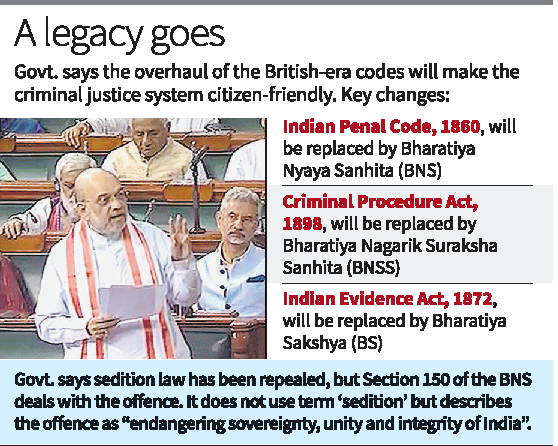TOPICS COVERED:
Structure, organization and functioning of the Executive and the Judiciary—Ministries and Departments of the Government; pressure groups and formal/informal associations and their role in the Polity.
Context:
Union Home Minister introduced three bills in the Lok Sabha to replace the Indian Penal Code, Code of Criminal Procedure and the Indian Evidence Act with the Bharatiya Nyaya Sanhita, the Bharatiya Nagarik Suraksha Sanhita and the Bharatiya Sakshya Bill respectively.
Changes in CrPC:

Greater use of technology
- Trials, appeal proceedings, recording of depositions including those of public servants and police officers, may be held in electronic mode.
- The statement of the accused too can be recorded through video-conferencing.
- Summons, warrants, documents, police reports, statements of evidence can be done in electronic form.
- The search and seizure of articles and properties, the visit to a crime scene, and the recording of the victim’s statement shall be audio-videographed.
- The name and address of an arrested accused and the nature of the offence will be maintained by a designated officer, and shall be prominently displayed including in digital mode in every police station and district headquarters.
- Information to police too can be sent electronically, and it shall be taken on record on being signed by the person sending it, within three days.
Communication devices
- On the directions of a court or police officer, a person is required to produce any document and now devices that is likely to contain digital evidence for the purpose of an inquiry.
- Electronic communication is defined as the communication of any written, verbal, pictorial information or video content transmitted (whether from one person to another, from one device to another or from a person to a device or from a device to a person).
Use of handcuffs
A police officer may be permitted to use handcuffs while arresting a person if he is a habitual, repeat offender who escaped from custody, or has committed:
- an organised crime,
- terrorist act,
- drug-related crime,
- illegal possession of arms,
- murder, rape, acid attack,
- counterfeit currency,
- human trafficking,
- sexual offence against children or
- offences against the state.
Specific safeguards
Section 41A of CrPC — which has a prominent safeguard against arrests — will get a new number, Section 35.
It has an additional provision:
- no person can be arrested without prior permission of an officer, not below the rank of a deputy SP, in cases where the offence is punishable with less than three years, or if the person is infirm above 60 years of age.
- On receiving information in cognizable cases where the offence attracts 3-7 years, the police officer will conduct a preliminary inquiry to ascertain whether there exists a prima facie case to proceed within 14 days.
Mercy petitions
- There is a provision on procedures for the timeframe to file mercy petitions in death sentence cases.
- After being informed by jail authorities about the disposal of the petition of a convict sentenced to death, he, or his legal heir or relative can submit a mercy petition within 30 days to the Governor.
- If rejected, the person can petition the President within 60 days.
- No appeal against the order of the President shall lie in any court.
Sanction to prosecute
- A decision to grant or reject sanction to prosecute a public servant must be reached by the government within 120 days of receiving a request.
- If the government fails to do so, the sanction will be deemed to have been accorded.
- No sanction is required in cases including sexual offences, trafficking, etc.
Changes in IPC:
- New clause on false promise to marry
- Within the proposed Bharatiya Nyaya Sanhita, 2023, is a clause on using “deceitful means” to promise to marry a woman.
- Such a section does not exist in the IPC of 1860.
- Deceitful means will include the false promise of employment or promotion, inducement or marrying after suppressing one’s identity.
- Difference between a false promise to marry & breach of promise
- Where the promise to marry is false, and the intention of the maker at the time was not to abide by it from the beginning itself, but to deceive the woman to convince her to engage in sexual relations, there is a misconception of fact that vitiates the woman’s consent.
- Meanwhile, a breach of a promise itself cannot be said to be a false promise
SOURCE: THE HINDU, THE ECONOMIC TIMES, PIB
 Chinmaya IAS Academy – Current Affairs Chinmaya IAS Academy – Current Affairs
Chinmaya IAS Academy – Current Affairs Chinmaya IAS Academy – Current Affairs



